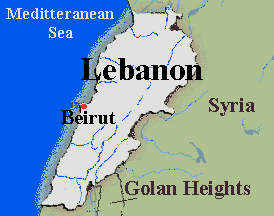EU observers preparing for "complex" Lebanese challenge
 Beirut - The head of the European Union's 90-man election observation team in Lebanon, which is taking up its duties for this Sunday's parliamentary election, has said that he hopes the presence of his team will boost the transparency of the upcoming poll.
Beirut - The head of the European Union's 90-man election observation team in Lebanon, which is taking up its duties for this Sunday's parliamentary election, has said that he hopes the presence of his team will boost the transparency of the upcoming poll.
In an interview with the German Press Agency dpa, Jose Ignacio Salafranca Sanchez-Neyra, a Spanish-born member of the European Parliament, and the EU mission's chief observer, said that "we are only here to observe. But we know that ... this is a complicated country."
On June 7, Lebanon will elect 125 seats out of the 128 seat parliament, according to the country's confessional-quota system, which apportions representatives in line with the 16 religious confessions.
I can say that the (Lebanese system) is complex and we should be well prepared to face this situation, and to have an objective and professional approach," he said.
We are here, independent, under the invitation of the Lebanese government to follow this electoral process. The objective is to follow the electoral process, to see in which measures these elections will take place according to international standards," Salafranca said.
"Our mission is to analyze the general structures, to observe how the electoral administration will lead the project and analyze the activities of political parties," he told dpa at the EUs mission office in the heavily guarded Movenpick Hotel in Beirut.
The parliamentary election is widely seen as crucial for Lebanon, as it could involve a transfer of power from the ruling Western- backed March 14 coalition, to the Iran-and-Syria-backed Islamist movement Hezbollah.
The country has maintained a delicate, and sometimes fractious, balance since the unity government was formed with Hezbollah in opposition in 2008.
The EU mission will be made up of 90 personnel, including 30 long- term observers and around 50 short-term observers. The team will be deployed across Lebanon, including areas that are under Hezbollah control.
Salafranca, who also headed the EU's mission to Lebanon for the 2005 parliamentary election when it was the only international observation delegation, said others will be monitoring the Lebanese elections but the EU mission remains the largest.
We are the largest mission of all the international missions," he said, adding that the EU mission has the capacity to observe the elections across all Lebanese regions.
According to the Lebanese interior ministry, a total of 250 foreign observers, including from the US-based Carter Centre as well as observers from Russia and Turkey, will be monitoring the vote.
Following the 2005 polls, the EU issued a long and critical assessment of Lebanons electoral process, offering a series of recommendations involving many reforms to the system. In September 2008, a law was passed by the Lebanese parliament, including a small number of the EU's recommendations.
Upon his arrival in Lebanon earlier this month, Salafranca hailed the fact that the new electoral law had introduced some financial regulations to the electoral campaigns as well as the decision to hold the legislative election in all Lebanese regions in one day. Elections were previously held over consecutive Sundays in each district of the country.
There are some improvements in the law, especially concerning the norms according to which the media should proceed during the electoral campaigns, and also that (electoral) financing would not be subject to the bank secrecy system," he said.
Salafranca also hailed the fact that the new law allowed people to vote using their personal identity card, as there had been alleged cases of corruption and manipulation of electoral cards in previous elections.
There are also facilities for disabled people, and we welcome the fact that peoples confessions were removed from registers," he said, although voters still had to cast their ballots in booths distributed along religious lines.
Salafranca has met with the leaders of the main Lebanese parties, including Hezbollah second-in-command, Naeem Qassim.
"We talked a lot about the general electoral structures. I stressed the importance of carrying out the electoral process away from political conflicts," Salafranca said.
The EU official reiterated his hopes that the forthcoming election will be held in a peaceful and constructive atmosphere.
The EU has donated 4 million euros (5.2 million dollars) to help Lebanon reform its electoral law. The bloc is set to spend a further 4.7 million euros on the election monitoring mission. (dpa)